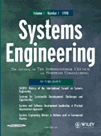
Systems Engineering
Scope & Guideline
Advancing Knowledge in Computer Networks and Hardware Architecture
Introduction
Aims and Scopes
- Model-Based Systems Engineering (MBSE):
A core area of focus, MBSE emphasizes the use of models to support system requirements, design, analysis, and verification, facilitating better communication among stakeholders and improving system quality. - Interdisciplinary Applications:
The journal publishes research that crosses various fields, including aerospace, transportation, and public policy, showcasing how systems engineering principles can be applied across different domains. - Human Systems Integration:
Research on integrating human factors into system design is prevalent, highlighting the importance of user-centered approaches and human readiness in the development of complex systems. - Digital Engineering and Cyber-Physical Systems:
There is a significant emphasis on digital transformation, including the use of digital twins and other digital engineering techniques to enhance system lifecycle management and operational efficiency. - Risk and Resilience in Systems:
The journal explores methodologies that assess and enhance the resilience of systems, particularly in the context of complex and dynamic environments. - Innovation and Emerging Technologies:
Research that addresses the incorporation of new technologies, such as AI and machine learning, into systems engineering practices is a notable focus, reflecting the journal's commitment to advancing the field.
Trending and Emerging
- Integration of Artificial Intelligence and Machine Learning:
There's a noticeable increase in research that integrates AI and machine learning techniques into systems engineering processes, enhancing decision-making, predictive analytics, and system optimization. - Sustainability and Green Systems Engineering:
Emerging themes focus on sustainability, including the engineering of green systems and the assessment of environmental impacts, responding to global calls for more sustainable practices in technology and infrastructure. - Cybersecurity in Systems Engineering:
With the rise of digital systems, there is a growing emphasis on incorporating cybersecurity measures into systems engineering, ensuring that systems are resilient against cyber threats. - Human-Centric Systems Design:
Research focusing on human factors and user experience is gaining traction, emphasizing the importance of human-centered design in the development of complex systems. - Complex Adaptive Systems and Resilience Engineering:
There is an increasing interest in understanding complex adaptive systems and developing methodologies that enhance resilience in dynamic environments, reflecting contemporary challenges faced by systems engineers. - Digital Twin Technologies:
The application of digital twin technologies to monitor, simulate, and optimize system performance throughout the lifecycle is becoming a prevalent theme, showcasing the intersection of physical and digital domains.
Declining or Waning
- Traditional Systems Engineering Methods:
There seems to be a waning interest in conventional systems engineering methodologies, as more researchers focus on innovative, model-based approaches that leverage digital tools and data analytics. - Sector-Specific Applications:
Research that focuses narrowly on specific sectors (e.g., traditional manufacturing) appears to be decreasing, as the field trends towards more integrated, cross-sector solutions that address broader systems challenges. - Static Frameworks and Standards:
Studies centered around rigid frameworks and standards without adaptability to emerging technologies are becoming less frequent, as the community increasingly values agile and dynamic approaches to system design. - Purely Theoretical Studies:
The journal is moving away from purely theoretical explorations of systems engineering principles towards more applied research that demonstrates practical impacts and real-world applications.
Similar Journals
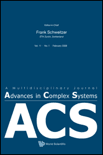
ADVANCES IN COMPLEX SYSTEMS
Innovating Insights into Complex InteractionsADVANCES IN COMPLEX SYSTEMS is a prominent journal dedicated to the multidisciplinary exploration of complex systems, published by World Scientific Publishing Co. PTE LTD in Singapore. With an ISSN of 0219-5259 and E-ISSN of 1793-6802, the journal has been a vital platform for researchers and professionals since its establishment in 2004, contributing to the field of Control and Systems Engineering as well as a broader multidisciplinary audience. The journal currently holds a respectable Scopus rank of #240/321 in Engineering Control and Systems Engineering, placing it in the 25th percentile and reinforcing its commitment to fostering innovative research. Although it does not operate under an open access model, the advances published within are essential for those seeking to understand and harness the complexities of system interactions. As it converges towards its upcoming milestone in 2024, ADVANCES IN COMPLEX SYSTEMS remains a crucial resource for scholars, providing insights and advancements that drive the understanding of complex phenomena across various domains.
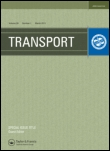
Transport
Driving the future of automotive and mechanical engineering.Transport is a leading open-access journal published by VILNIUS GEDIMINAS TECH UNIVERSITY, specializing in the fields of automotive and mechanical engineering. Since its transition to open access in 2018, the journal has become a vital platform for disseminating high-quality research and innovative practices in transport systems, engineering technologies, and sustainable mobility solutions. With an ISSN of 1648-4142 and an E-ISSN of 1648-3480, Transport is indexed in Scopus with notable rankings, including Q2 in Automotive Engineering and Q3 in Mechanical Engineering for 2023, reflecting its influential presence within these disciplines. Researchers and practitioners are encouraged to contribute to this scholarly community, where their work will reach a robust international audience, thereby advancing knowledge and fostering collaborations in the ever-evolving transport sector. Based in Lithuania, the journal is committed to maintaining rigorous peer-review standards and promoting interdisciplinary studies to address the complex challenges in transportation engineering.

Elektronika Ir Elektrotechnika
Pioneering Insights in Electrical and Electronic ResearchElektronika Ir Elektrotechnika is a premier academic journal dedicated to the field of electrical and electronic engineering, published by Kaunas University of Technology, Lithuania. With an Open Access model since 2004, this journal ensures that cutting-edge research is accessible to a global audience, facilitating the dissemination of knowledge and fostering innovation in the engineering community. The journal is currently categorized in the Q3 quartile for Electrical and Electronic Engineering as of 2023 and holds a Scopus ranking of #473 out of 797, placing it in the 40th percentile. Covering a diverse range of topics from emerging technologies to foundational research, Elektronika Ir Elektrotechnika serves as an invaluable resource for researchers, professionals, and students alike, supporting the advancement of both theoretical and practical aspects in electrical engineering. As we converge towards the years 2008 to 2024, the journal invites submissions that contribute to the evolving landscape of the discipline, aiming to inspire future innovations and collaborations.
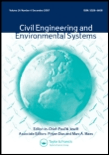
CIVIL ENGINEERING AND ENVIRONMENTAL SYSTEMS
Innovating Civil Engineering for Tomorrow's ChallengesCIVIL ENGINEERING AND ENVIRONMENTAL SYSTEMS, published by Taylor & Francis Ltd, is a pivotal academic journal dedicated to advancing the field of civil and structural engineering as well as environmental systems. With its ISSN 1028-6608 and E-ISSN 1029-0249, this journal serves as a crucial platform for disseminating high-quality research from 1998 through 2024. Recognized in the Scopus Ranks as #177 out of 379 in its category, equating to a 53rd percentile ranking, it holds a respectable Q3 category designation in Civil and Structural Engineering for 2023. The journal aims to bridge theoretical research and practical applications, showcasing innovative approaches and solutions to contemporary engineering challenges. Scattered across its pages are valuable insights from both emerging and established experts, making it an essential resource for researchers, professionals, and students seeking to enhance their understanding and impact within the civil engineering and environmental systems landscape. While it does not offer open access, the journal is part of a well-regarded publishing legacy, ensuring rigorous peer review and editorial standards that contribute meaningfully to academia and industry alike.

Management Systems in Production Engineering
Elevating Standards in Management Systems ResearchManagement Systems in Production Engineering is a premier open-access journal published by SCIENDO that has been dedicated to advancing the field of industrial and manufacturing engineering since its inception in 2011. With a robust ISSN of 2299-0461 and E-ISSN of 2450-5781, this journal serves as a vital resource for researchers and professionals seeking to explore innovative solutions and best practices in production management. Based in Germany, and operating with a distinguished presence in Poland, this journal has quickly made a name for itself, currently ranking in the Q2 quartile for Industrial and Manufacturing Engineering and Q3 for Management Information Systems and Management of Technology and Innovation as of 2023. It holds impressive positions in Scopus rankings, showcasing its growing influence and relevance in the engineering and business sectors. Designed to facilitate the exchange of valuable knowledge and insights, Management Systems in Production Engineering invites contributions that reflect on contemporary challenges and advancements in production systems, thereby offering crucial perspectives for academia and industry alike, from 2018 through 2024.
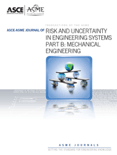
ASCE-ASME Journal of Risk and Uncertainty in Engineering Systems Part B-Mechanical Engineering
Bridging Theory and Application for Safer EngineeringASCE-ASME Journal of Risk and Uncertainty in Engineering Systems Part B-Mechanical Engineering, published by the reputable ASME, is a leading platform dedicated to advancing knowledge in the field of mechanical engineering with a particular emphasis on risk assessment and uncertainty analysis. With an ISSN of 2332-9017 and an E-ISSN of 2332-9025, this journal has established itself as a significant contributor to ongoing research in safety, risk, and reliability, consistently ranking in the Q2 quartile for Mechanical Engineering as well as Safety Research categories. As evidenced by its impressive Scopus rankings—including a notable 80th percentile in Safety Research—this journal fosters high-quality research that informs engineering practices and enhances safety protocols. Operating under a traditional access model, it aims to provide researchers, professionals, and students with essential insights and methodologies to address contemporary challenges in engineering systems. Each contribution reflects an aim to bridge theory and application, thus making the journal an invaluable resource for stakeholders striving for excellence in mechanical engineering and safety management.
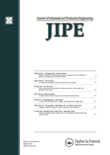
Journal of Industrial and Production Engineering
Shaping the Future of Production SystemsWelcome to the Journal of Industrial and Production Engineering, a premier academic publication dedicated to advancing the fields of Industrial Engineering and Production Engineering. Published by TAYLOR & FRANCIS LTD, this journal has established itself as a vital resource for researchers, professionals, and students seeking to enhance their understanding of engineering processes and systems. With an impressive 2023 quartile ranking of Q1 in Industrial and Manufacturing Engineering and Q2 in Control and Systems Engineering, the journal reflects a robust impact within its discipline, underscoring its commitment to disseminating high-quality, peer-reviewed research. Covering a comprehensive range of topics from optimization techniques to innovative production systems, the Journal of Industrial and Production Engineering not only facilitates scholarly dialogue but also fosters practical applications that address contemporary industrial challenges. Although not an Open Access journal, it continues to serve as an essential platform for sharing valuable insights within the engineering community.

KYBERNETES
Fostering Innovation Across Artificial Intelligence and Control SystemsKYBERNETES is a leading peer-reviewed journal published by Emerald Group Publishing Ltd, focusing on the interdisciplinary fields of Artificial Intelligence, Computer Science, Control and Systems Engineering, and related domains. Since its inception in 1972, KYBERNETES has established itself as a vital resource for researchers and practitioners, offering insights into the theoretical and practical aspects of cybernetics and its applications. With a notable impact factor reflected in its impressive Q1 and Q2 rankings across various categories, including Social Sciences and Electrical and Electronic Engineering, the journal is recognized for its contribution to advancing knowledge and fostering innovation within these fields. KYBERNETES appeals to a diverse audience, ranging from seasoned professionals to budding students, providing a rich platform for disseminating high-quality research and practical findings. While the journal is not open access, it offers comprehensive subscription options, ensuring that critical information is accessible to those engaged in these rapidly evolving disciplines.

Bulletin of the New Zealand Society for Earthquake Engineering
Advancing earthquake resilience through innovative research.Bulletin of the New Zealand Society for Earthquake Engineering (ISSN: 1174-9857, E-ISSN: 2324-1543) is a leading scholarly journal published by the New Zealand Society for Earthquake Engineering, Inc., dedicated to advancing the field of earthquake engineering. Since its inception in 1970, the journal has provided a vital platform for the dissemination of innovative research, technical studies, and case reports related to civil and structural engineering, as well as geotechnical engineering and engineering geology. Recognized for its significant contributions, the journal holds a Q2 ranking in both the Civil and Structural Engineering and Geotechnical Engineering and Engineering Geology categories as of 2023. It serves as an invaluable resource for researchers, professionals, and students keen on enhancing their understanding of earthquake resilience and engineering practices. While the journal operates under subscription-based access, its rigorous peer-review process ensures that published articles meet the highest academic standards, making it a credible source for the global engineering community.
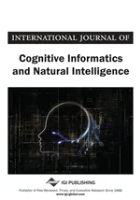
International Journal of Cognitive Informatics and Natural Intelligence
Innovating at the Intersection of Intelligence and TechnologyThe International Journal of Cognitive Informatics and Natural Intelligence, published by IGI Global, is an essential resource for researchers and professionals exploring the intersections of cognitive informatics, artificial intelligence, and human-computer interaction. Since its establishment in 2007, this journal has focused on advancing the understanding of cognitive systems and their applications in natural intelligence, contributing significantly to the fields of software engineering and interface design. Operating out of the United States, the journal aims to disseminate high-quality research and innovative methodologies to foster interdisciplinary collaboration. Despite its current standing in Q4 quartiles for the fields of Artificial Intelligence, Human-Computer Interaction, and Software, it serves as a vital platform for emerging scholars and seasoned professionals alike seeking to explore new frontiers in cognitive technologies. While it does not provide direct open access, these publications are instrumental in shaping academic discourse, and contribute to ongoing advancements in how we understand and integrate cognitive science into practical applications.